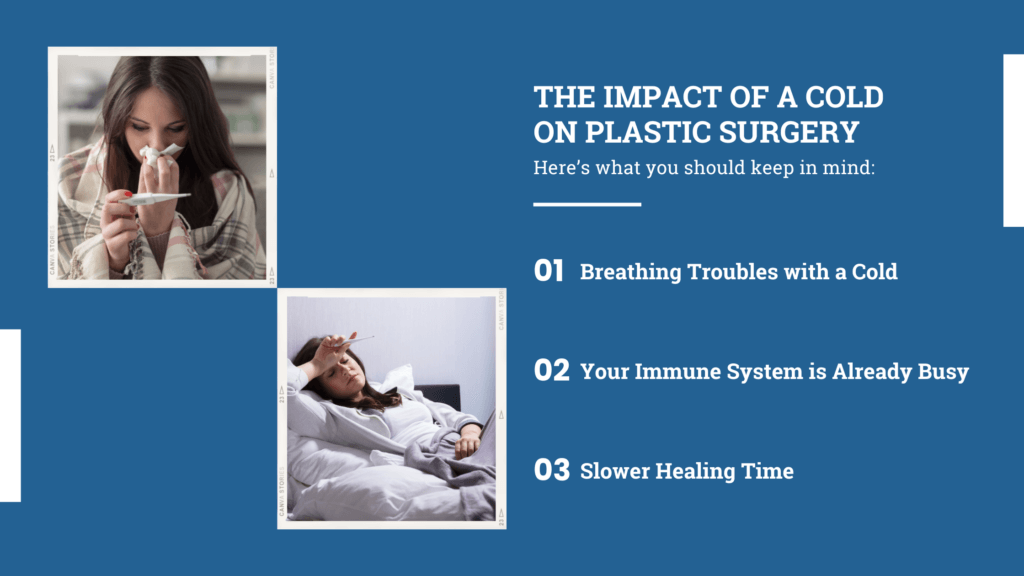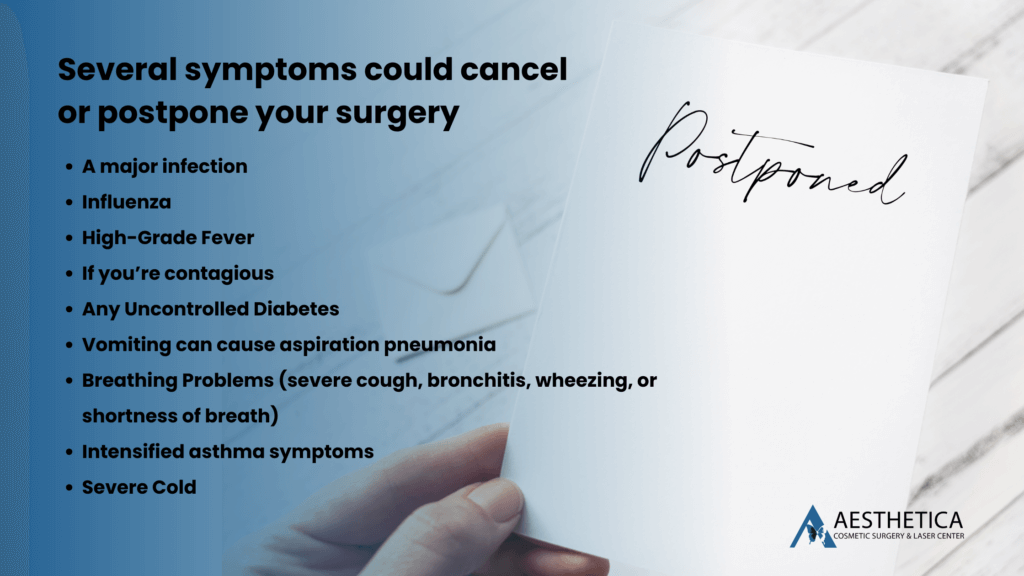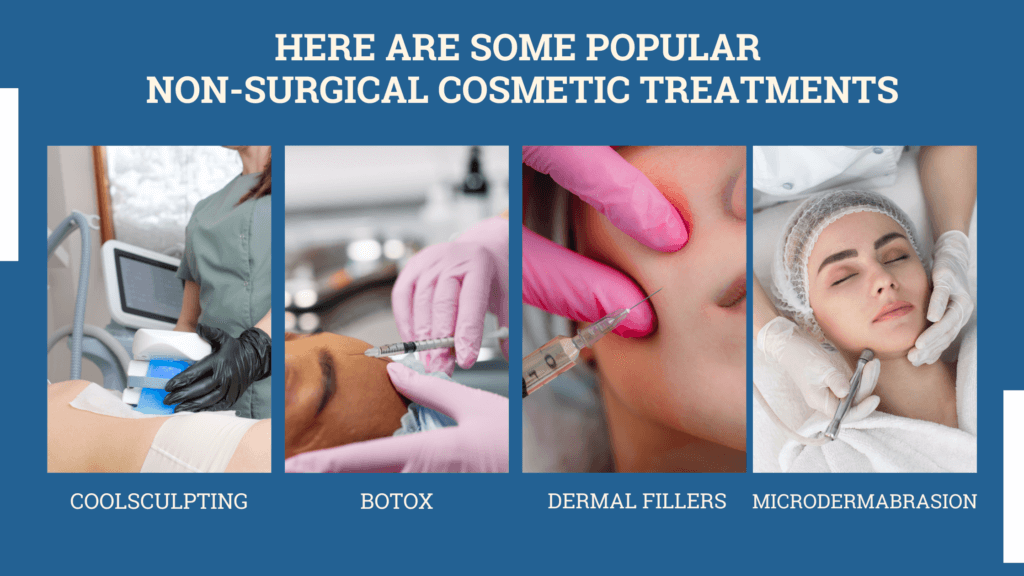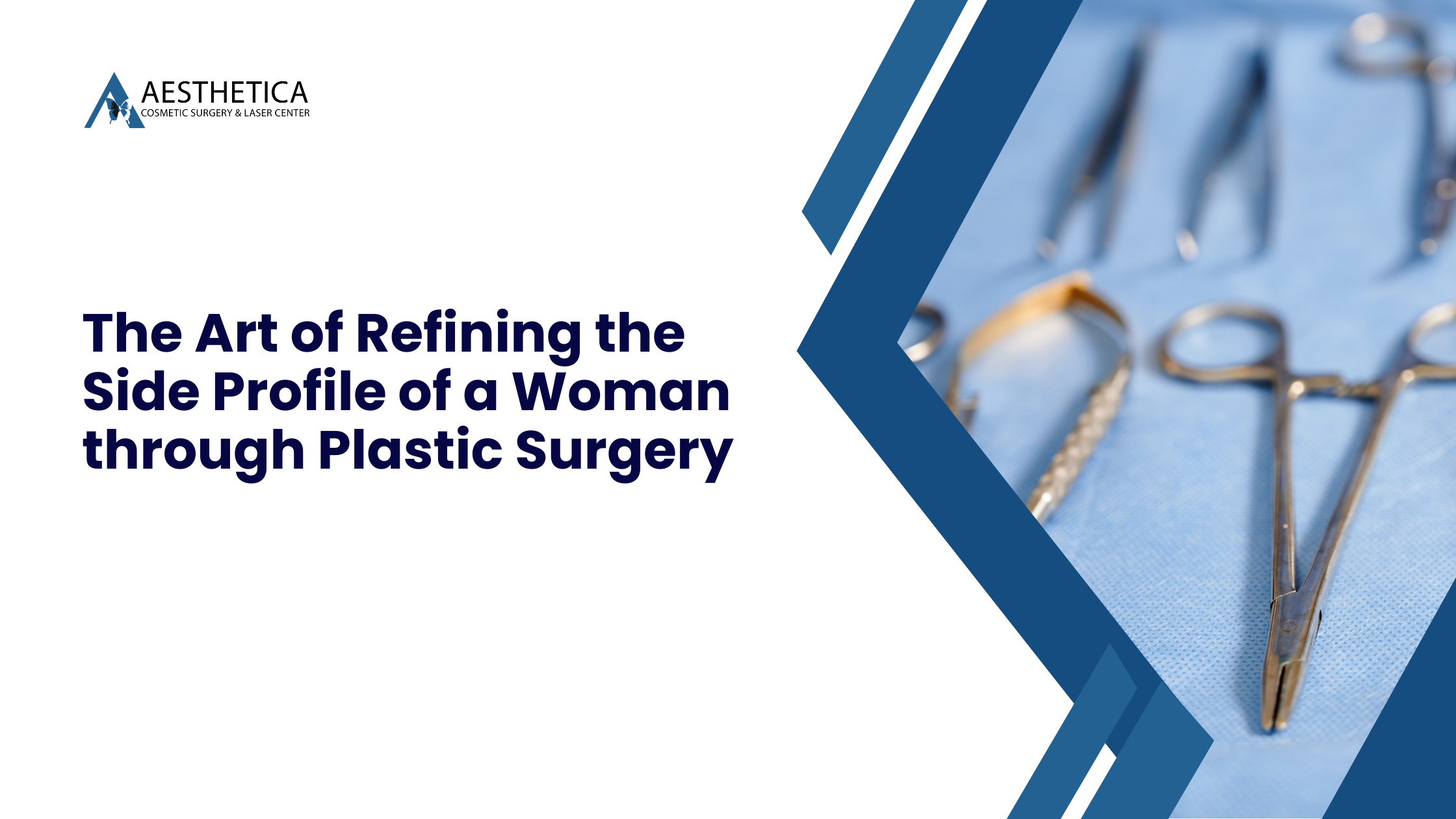Can I Have Plastic Surgery if I Have a Cold?10 min read

Aesthetica Editorial Team

A common question that pops up a lot is: “Can I still get plastic surgery if I have a cold?”
It might seem like a small thing, but knowing how a cold could affect your surgery is important, for keeping you safe and ensuring you get the extraordinary results you’re looking for.
Besides, plastic surgery is more than just achieving aesthetic outcomes; it’s fundamentally about ensuring your safety and well-being throughout the journey.
Understanding the Risks: The Impact of a Cold on Plastic Surgery

Although we often brush off a cold as if it were no big deal, it can make things a bit trickier when it comes to healing after surgery. Here’s what you should keep in mind:
- Breathing Troubles with a Cold: If you’re sniffling and coughing, these minor annoyances can become bigger problems when under anesthesia. The last thing you want is bronchospasm (where your airways tighten) or even pneumonia.
- Your Immune System is Already Busy: Think of a cold as a sign that your immune system is in the middle of a boxing match with an infection. If you head into surgery while this fight is still on, you’re asking your body to do extra work. This can make it harder for you to heal after your surgery.
- Slower Healing Time: Ever notice how a simple cold can hang around longer than you want? That’s because a viral infection, like a cold, slows your body’s repair process. After surgery, this can mean a longer recovery time and a higher chance of running into post-op complications.
So, before you go ahead with your plastic surgery plans, consider how your cold might play a role. It’s all about ensuring you get the best results and the smoothest recovery!
Pre-Surgery Evaluation: Assessing Your Health
Before you head into plastic surgery, there’s this vital step called the pre-surgery evaluation. It’s all about ensuring you’re in good shape for the procedure. Here’s a quick look at what this involves:
- Going Over Your Medical History: Dr. Chang will check your medical records to spot anything necessary for your surgery. He’s looking for any health issues that could affect your surgery.
- The Physical Exam: This is where your surgeon checks how you’re doing health-wise right now. They’ll give you a physical check-up, keeping an eye out for any signs of a cold or infections, just to be sure you’re ready for surgery.
- Talking it Out with Your Surgeon: This is your opportunity to discuss with your surgeon what it means if you’re considering surgery while having a cold. You’ll go over the risks and benefits together, helping you make an informed choice about your surgery.
Top 3 Secrets to Boost Your Health Before Surgery

Before you get sick, let’s talk about how to boost your immune system and stay healthy before surgery.
There are three categories of health improvement you can work on before surgery. Let’s review those.
What's on Your Plate? Nutritional Tips for a Stronger You
Eating healthy foods is the first way you can keep your body in tip-top shape.
This includes:
- Fruits and veggies
- Vitamin supplements
- Low-sugar foods
- High-fiber foods
- Whole grains
- Proteins
In addition, there are a few foods and drinks you should avoid, such as:
- Alcohol
- High-sodium foods
Through healthy eating, you can manage your pre-surgery health and combat sickness.
Can Exercise and Relaxation Shape Your Surgery Success?
Getting regular exercise is another easy way to do this.
Exercise increases blood flow, healing your body faster.
Take advantage of the time before your surgery to get your blood moving.
You should also relax and avoid stress during this time.
There’s nothing like stress to make you susceptible to sickness.
So, take time off from burdensome activities and routines and enjoy peace and quiet.
Why Sleep and Hydration Can Make or Break Your Surgery Prep
Finally, sleeping and hydrating are musts before your big day.
Being tired makes it easier to get sick and harder to heal after surgery.
So, treat yourself to long nights with plenty of sleep.
Staying hydrated is always a good plan, but it’s especially important when you’re trying to avoid illness.
A constant water flow flushes germs out of your body and loosens congestion.
When to Postpone Surgery: Making the Right Decision
When you’re thinking about getting plastic surgery but have a cold, deciding whether to go ahead with the surgery or wait it out is important. Here’s a breakdown of what to consider before making your decision:
- How Bad Are Your Cold Symptoms? You might not need to postpone your surgery if it’s just a little sniffle or a mild cough. But if you’re dealing with more muscular symptoms like a high fever or a lot of chest congestion, or if you’re feeling wiped out, it’s usually a good call to reschedule.
- What Kind of Surgery Are You Having? The type of surgery you’re planning can make a big difference. Surgeries that involve your respiratory system or are more complex might be more affected if you have a cold. These procedures could be trickier to handle when you need to feel better.
- Overall Health Matters: Your general health and your immune system is strength are super crucial in deciding whether to go ahead with surgery. If your body is already trying to fight off a cold, it might not be the best time to put it through surgery.
Should I Postpone Surgery or Not?

Once you’ve realized that you’re sick, you should contact your plastic surgeon right away. Explaining your symptoms can help determine whether or not to postpone the surgery.
Several symptoms could lead to canceling or postponing your surgery, but many depend on your specific experience with the sickness.
- A significant infection, like meningitis, will result in postponing your surgery. A minor one, like a UTI (urinary tract infection), probably won’t.
- Influenza almost always necessitates postponing surgery.
- A low-grade fever may not be a cause to postpone, but a high-grade fever certainly will be.
- If you’re contagious, Dr. Chang will postpone your surgery until you are not.
- Any uncontrolled diabetes will move the surgery date until your blood sugar levels are better under control.
- Vomiting can cause aspiration pneumonia, so this is also a reason to move your surgery date.
- Breathing problems, like a severe cough, bronchitis, wheezing, or shortness of breath, will all interfere with the anesthesia, resulting in a postponed surgery.
- Intensified asthma symptoms also cause problems during surgery, so you’ll need to have your surgery moved.
- A mild common cold isn’t an issue, but Dr. Chang often decides to postpone surgery for a more severe cold.
- A mild sore throat isn’t a concern, but a severe one is another reason to move the surgery date.
Always keep in mind, however, that even if you have to postpone your surgery, it might not be for long.
Some illnesses resolve within a week or even a few days, so your surgery will only be postponed until you are better.
For example, with strep throat, you’ll not be contagious after 24 hours on medication, and you can reschedule for soon after your original date.
Even though rescheduling your surgery can be a big disappointment and very frustrating, recovery is much more relaxed when you’re healthy.
Don’t let sickness get you down—the road to recovery is the road to a successful surgery!
Postponement and Rescheduling: Patient-Centric Care
Deciding to push back your surgery? Here’s what happens next:
- Picking a New Date: If you need to delay your surgery because of a cold, don’t worry. The main focus is on you and what’s best for your health. You and Dr. Chang will work together to find a new date that fits your schedule and ensures you’re in the best shape for surgery.
- Help Along the Way: You’ll get plenty of advice on how to get ready for the new surgery date and tips on how to get over your cold quickly. The goal is to make you feel better and prepared for your surgery day.
- Keeping an Eye on Your Health: In the meantime, your doctor will closely monitor how you’re doing. They’ll ensure you’re recovering from your cold and that your health is top-notch for the rescheduled surgery.
Safety First in Plastic Surgery
The decision to proceed with plastic surgery when having a cold is a careful balance between the urgency of the procedure and your health.
The guiding principles in such situations are prioritizing safety and ensuring the best outcomes. Consulting with your plastic surgeon and following their professional advice is the best action.
Exploring Non-Surgical Cosmetic Alternatives: Safe Options When You Have a Cold

For individuals considering cosmetic enhancements but currently dealing with a cold, several non-surgical options might be suitable alternatives.
These procedures typically involve less risk of complications related to respiratory infections like a cold, and they often require less recovery time. Here are some popular non-surgical cosmetic treatments:
- CoolSculpting: This is a noninvasive procedure designed to reduce stubborn fat. It works by freezing the fat cells, which the body then naturally eliminates. The significant advantage here is that it doesn’t involve surgery or needles, and there’s no downtime required after the treatment.
- BOTOX: BOTOX is widely known for its ability to relax facial muscles, leading to reduced wrinkles and a smoother skin appearance. These injections are a popular choice for non-surgical facial rejuvenation and can also be used to reduce the volume of fat in certain areas.
- Dermal Fillers: These are used to restore volume and fullness to the face, reduce wrinkles, and enhance facial contours. Fillers are a versatile option for non-surgical facial enhancement.
- Microdermabrasion: This is a minimally invasive procedure used to renew overall skin tone and texture. It can improve the appearance of sun damage, wrinkles, fine lines, age spots, acne scarring, and other skin-related concerns and conditions.
These alternatives offer the benefit of cosmetic enhancement with a reduced risk profile compared to surgical procedures, especially when dealing with a temporary health issue like a cold.
It’s always best to consult with a qualified cosmetic practitioner to determine the most suitable option based on individual health status and aesthetic goals.
Ready to Enhance Your Look, Even with a Cold? Let's Get Started!
Feeling under the weather but still eager to give your appearance a boost? You don’t have to put your cosmetic goals on hold just because of a cold.
Our range of non-surgical treatments, like CoolSculpting, Botox, dermal fillers, and microdermabrasion, offers you a safe and effective way to enhance your beauty without the risks associated with surgery.
Meet us at 19500 Sandridge Way, Suite 350, Leesburg, VA 20176, or call us at (703) 574-4342 for a complimentary consultation with Board-Certified Plastic Surgeon Dr. Phillip Chang before moving forward with your procedure. If everything matches up, our team will help you navigate the entire process from beginning to end. Also, remember to check out our blog and social media for more information on cosmetic surgery trends!
Let Us Help You!
Our office can provide you with helpful information, schedule a free consultation, and walk you through the many services and procedures we provide.
Contact Dr. Chang's Office:
More Articles For You

The Latest Techniques in Double Chin Removal in Leesburg, VA
In the charming town of Leesburg, VA, where looking good and feeling great are top

The Art of Refining the Side Profile of a Woman through Plastic Surgery
In the realm of cosmetic enhancements, the side profile of a woman holds a pivotal

Enhance Now, Pay Later: Plastic Surgery Payment Plans in Leesburg, VA
In the picturesque town of Leesburg, VA, pursuing beauty and self-improvement is a journey many

Areola Reduction for Men in Loudoun County
In the heart of Loudoun County, where the beauty of nature meets bustling urban life,
